Article 80: Searching for the source of wealth from the coffee house
The economist Adam Smith drafted much of his classic “The Wealth of Nations” (1776) in a British coffee house. Since then, people’s perception of economics has completely changed.
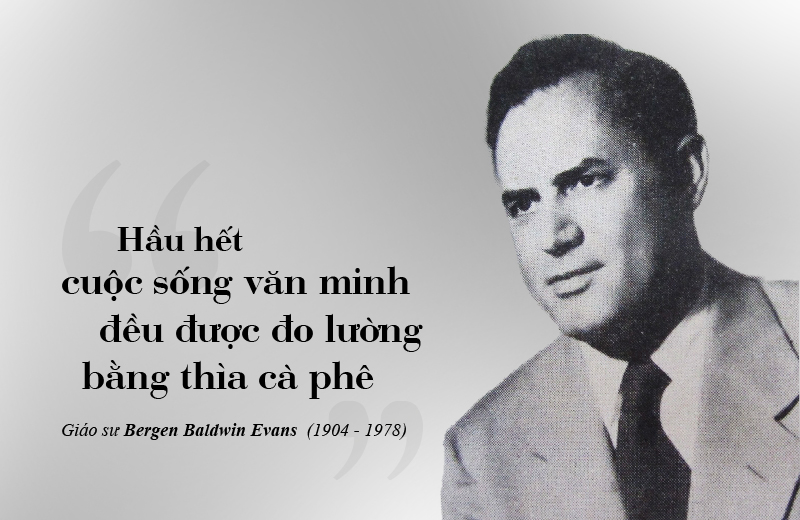
Most civilized lives are measured out with coffee spoons. Professor Bergen Baldwin Evans (1904- 1978)
Where the basic discoveries of economic behavior were initiated
In an era that saw the rise of modern industrial and capitalist society, the birth of coffee culture changed the course of the history of Western civilization, especially Great Britain. The first coffee houses in London spanned Cornhill Street, home to the Royal Exchange – Britain’s first dedicated commercial building. In the 17th century, London was known as the international business capital, and Cornhill was the financial nucleus of London. Along with the Royal Exchange, the emergence of joint stock companies such as Virginia, East India, Royal African attracted many merchants to Cornhill. The coffee house became a meeting place for like-minded people looking for commercial or financial investment opportunities.
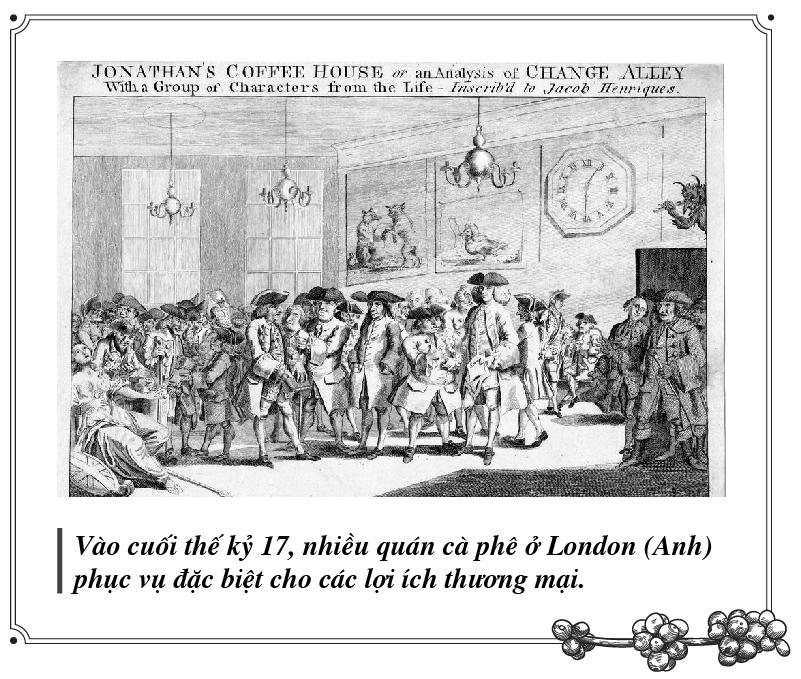
In the late 17th century, many coffee houses in London (England) catered specifically to commercial interests.
In particular, after the monarchy was restored in 1660, England experienced a strong revival of trade and investment. Coffee houses became more and more popular, growing into a large network throughout London. Merchants used coffee houses as offices, which in turn led to the Financial Revolution giving birth to new financial institutions and business models.
Edward Lloyd’s Coffee House in the 1680s was the site of important trades for maritime merchants and ship owners. This was the premise of establishing the oldest insurance empire Lloyd’s in the world. The Jonathan’s Coffee House was the meeting place for financiers and public-auction brokers that evolved into the London Stock Exchange. The Baltic Exchange was born out of the Virginia and Baltick Coffee House on Threadneedle Street and has remained to this day a reputable source of marine market information. Global auction houses like Sotheby’s and Christie’s all have their roots in the coffee house.
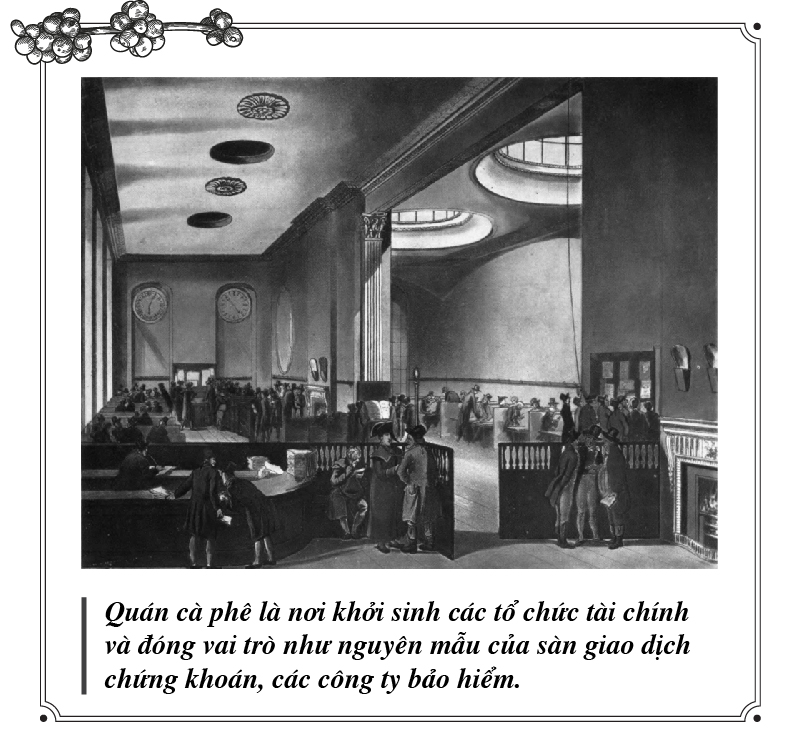
Coffee houses were the birthplace of financial institutions and served as prototypes of stock exchanges and insurance companies.
Acting as a tangible market, coffee houses were therefore thoroughly integrated into the economy and changed the nature of British society and economic life in the late 17th century and early 18th century. The growth of financial institutions and the stock market led to the expansion of commerce and increased British military power. While other powers were vying for territory, Britain had built a global trading network. In the 1720s, England was one of the most prosperous countries in the world. The leading position in commerce underpinned Britain’s position as the first industrialized nation.
The shaping and spreading of theories about the nature of wealth in coffee houses
The coffee house’s most important role in the economic system was to provide the perfect environment for the formulation of economic theories. Besides commercial transactions, merchants went to coffee houses to drink coffee and discuss the financial situation. Therefore, the coffee house was also a center for disseminating information about economic developments in continental Europe and distant colonies. Coffee house owners published bulletins listing commodity prices, exchange rates, government stock prices, and trade publications that catered to customers. Edward Lloyd’s coffee house printed its own newspaper called Lloyd’s News, which recorded the discussion and analysis of the market of merchants to provide to customers.
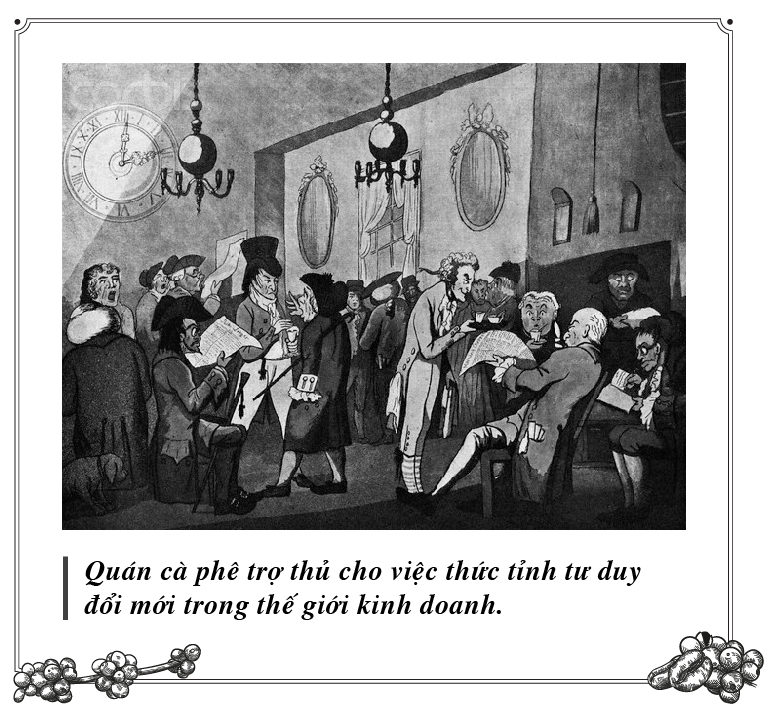
Coffee houses helped awaken innovative thinking in the business world.
The special environment of the coffee house attracted elites in many other fields such as politicians, philosophers, and scholars. They came to listen and participate in provocative discussions, and to take notes on information pouring in from around the world. Adam Smith (1723 – 1790) – the father of modern economics with economist David Hume (1711 – 1776), often met at John’s Coffee House on the Royal Mile, Edinburgh to share ideas on economic philosophy and ethics. David Hume’s theory of mercantilism and free trade greatly influenced Adam Smith’s thought. David Hume was also the one who introduced Adam Smith to the French economic theorists and reformers (les économistes), led by Francois Quesnay – the founder of Physiocracy theory. Conversations with the French economist prompted Smith to find a solution to the economic stalemate across continental Europe.
In the early stages of industrial production, society developed chaos, a few people had a lot of money to invest in production and quickly gained a monopoly, able to dominate the market, while workers and small consumers were deprived of wealth. Adam Smith wanted to eliminate the outdated economic thought of the mercantilism school, and at the same time establish an economic theory based on the complete freedom of each person in society. The accumulated wealth was put into the hands of everyone, from the business class to the lowest working class.
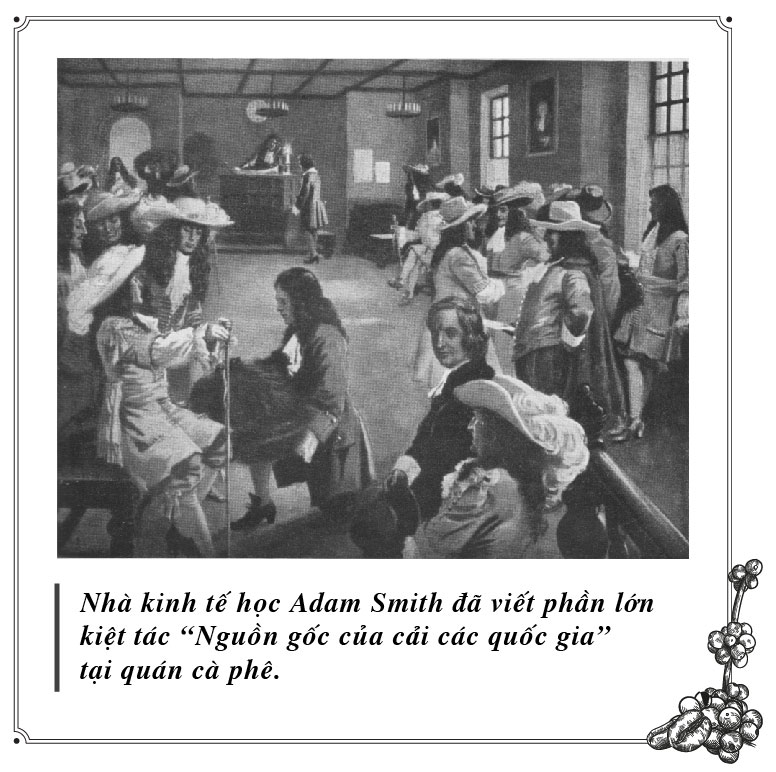
Economist Adam Smith wrote most of his masterpiece “The Wealth of Nations” at the coffee shop.
In 1773, Adam Smith arrived in London and was elected a Fellow of the Royal Society of London. While in London, Adam Smith spent most of his time working at the British Coffee House on Cockspur Street. He even rented a house next door for his convenience. British Coffee House was a gathering place for Scottish intellectuals and often had the Caledonian Mercury, Evening Courant, Weekly, Scots magazines available. There, Adam Smith completed the book “The Wealth of Nations” – a classic that laid the foundation for the science of the market economy.
“The Wealth of Nations” draws on research after engaging in discussions among economists regarding economic and social conditions in the early days of the Industrial Revolution. “The Wealth of Nations” explains why national wealth grows and how it brings prosperity to everyone. Smith argues that prosperity means not only the increase of material wealth, but also the fair and human treatment of people. Adam Smith’s economic theory provides the basis for policymakers to create an efficient framework in which production, price formation, and distribution are conducted in a reasonably harmonized manner between workers, capitalists and the state power system.
“The Wealth of Nations” exerted an influence on economics comparable to Isaac Newton’s “Mathematical Principles of Natural Philosophy” in physics and Charles Darwin’s “On the Origin of Species” in biology. This is also one of the precious books that the Founder and Chairman of Trung Nguyen Legend Group, Dang Le Nguyen Vu, wholeheartedly selected for the Life Changing Foundational Bookcase – A bookcase that unites the quintessence of human knowledge, contributing to creating a model nation, comprehensively rich in physical, material and spiritual forms.
Economics, after all, is to contribute to the creation of real wealth for people and for the entire global ecosystem. Seen in that way, progressive ideas are very active in the cafe space, helping to awaken thinking about the nature of wealth as well as the values that create prosperity, which is also part of the process of achieving sustainable prosperity.
THE REAL COFFEE
ROASTED ONLY FOR PEOPLE OF WISDOM!
Source: “The Philosophical Way of Coffee” – copyright by Trung Nguyen Legend


